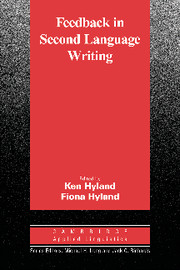Book contents
- Frontmatter
- Contents
- Contributors
- Series editors' preface
- Preface
- Chapter 1 Contexts and issues in feedback on L2 writing: An introduction
- I SITUATING FEEDBACK: SOCIOCULTURAL DIMENSIONS
- Chapter 2 Sociocultural theory: A framework for understanding the social-cognitive dimensions of peer feedback
- Chapter 3 Cultural issues in peer response: Revisiting “culture”
- Chapter 4 Appropriation, ownership, and agency: Negotiating teacher feedback in academic settings
- II SHAPING FEEDBACK: DELIVERY AND FOCUS DIMENSIONS
- III NEGOTIATING FEEDBACK: INTERPERSONAL AND INTERACTIONAL DIMENSIONS
- Author index
- Subject index
Chapter 2 - Sociocultural theory: A framework for understanding the social-cognitive dimensions of peer feedback
Published online by Cambridge University Press: 05 October 2012
- Frontmatter
- Contents
- Contributors
- Series editors' preface
- Preface
- Chapter 1 Contexts and issues in feedback on L2 writing: An introduction
- I SITUATING FEEDBACK: SOCIOCULTURAL DIMENSIONS
- Chapter 2 Sociocultural theory: A framework for understanding the social-cognitive dimensions of peer feedback
- Chapter 3 Cultural issues in peer response: Revisiting “culture”
- Chapter 4 Appropriation, ownership, and agency: Negotiating teacher feedback in academic settings
- II SHAPING FEEDBACK: DELIVERY AND FOCUS DIMENSIONS
- III NEGOTIATING FEEDBACK: INTERPERSONAL AND INTERACTIONAL DIMENSIONS
- Author index
- Subject index
Summary
Part of the great popularity that peer feedback enjoys today in L2 writing classrooms comes no doubt from its potential in providing learners with rich and extended assistance during the writing process. Peer response is thus often welcomed by teachers because it involves students sharing the responsibility of feedback. Part of the great appeal of peer feedback is also derived, in our view, from its strong foothold in theoretical principles relating social interaction and mediation to individual development. These principles are best expressed in the sociocultural theory (SCT) of the developmental psychologist Lev Vygotsky.
In this paper, we summarize our long-term research on peer feedback in the L2 writing classroom with a focus on how SCT contributes to illuminating and explaining the social-cognitive1 dimensions of L2 writing development. Within this framework, we discuss some salient aspects of our research on peer feedback, such as patterns of joint interaction and self-regulation; forms of mediation during interaction, development and internalization; and cultural issues in peer feedback.
The sociocultural theory framework
Traditionally associated with the work of Vygotsky (1978, 1986; see also Wertsch, 1979a), SCT is a system of ideas on the origin and development of the mind. Mind and consciousness are, from an SCT perspective, predominantly social in nature. They are fundamentally the result of the internalization of socially and temporally bound modes of thinking, feeling, and behaving. Within this theory, learning is also a social phenomenon embedded in specific cultural, historical, and institutional contexts.
Information
- Type
- Chapter
- Information
- Feedback in Second Language WritingContexts and Issues, pp. 23 - 41Publisher: Cambridge University PressPrint publication year: 2006
Accessibility standard: Unknown
Why this information is here
This section outlines the accessibility features of this content - including support for screen readers, full keyboard navigation and high-contrast display options. This may not be relevant for you.Accessibility Information
- 50
- Cited by
